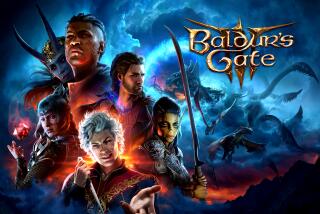A Virtual Cast of Thousands
- Share via
By day, Ron McKown is a mild-mannered technical manager at a Ventura County Internet service provider. By night, he becomes Golgotha, grandmaster warrior, sword-wielding slayer of monsters and protector of innocents in the city of Baja in the kingdom of Britannia.
McKown’s metamorphosis occurs in Ultima Online (https://www.ultimaonline.com), the Internet-based fantasy role-playing game from Electronic Arts subsidiary Origin Systems Inc. that has become a computer game industry phenomenon since its launch three months ago.
The game, one of the first so-called massive multi-player Internet games, allows more than 23,000 people to play on 10 duplicate Internet-based “worlds” at the same time.
From the looks of it, players can’t get enough of these graphics-laden virtual realms, where they can chat with fellow players while they’re slaying dragons or drinking at an inn. Within two weeks of its Sept. 25 commercial release, Origin sold more than 50,000 copies of Ultima Online’s $59.95 CD-ROM starter kit. It shipped retailers an additional 80,000 copies before Christmas, but officials wouldn’t disclose recent sales figures.
The game, which costs $9.95 a month to play, has spawned dozens of player-produced Web sites, electronic mailing lists and Usenet newsgroups where people swap tips and gossip, list upcoming events and brag about their online exploits.
In an industry where “normal” means 5% to 10% of a game’s registered users are logged on at any given time, Ultima Online has been attracting four to five times that number, said Origin co-founder Richard Garriott, speaking at a recent online-games conference.
“Average play time is three to four hours--that’s four to 10 times larger than anybody else,” Garriott said.
This despite software bugs and frequent overloads on Origin’s computer network, which sometimes unintentionally drops players’ modem connections. Both problems are common with new computer programs and Internet services, and Origin officials say they’re being addressed.
In many ways, Ultima Online is the bionic offspring of the Dungeons and Dragons role-playing games that have existed for years as board games or single-player computer games, pitting noble swordsmen against evil sorcerers and vicious monsters in magical lands reminiscent of medieval England.
But unlike traditional D&D; games, where the lone player becomes the center of the game, Ultima Online players are one in a cast of thousands. Beginners choose a character, customize their skin, eye and hair color, pick a profession, and train themselves to use weapons or other tools of their trade.
And unlike the more popular shoot-em-up Internet games such as Quake and Doom, the object of Ultima Online isn’t so much to win as to have your character mature as a person, gain possessions, seek adventure and basically amuse him- or herself.
Another difference: The game never shuts down. Its virtual world evolves whether players are online or not--the sun shines, night falls. There’s a working economy, based on gold coins, and activity-sensitive ecology: If too many people chop wood, there won’t be enough trees, and tree-dwelling animals will die off.
The terrain of the game’s fictional kingdom of Britannia covers 32,000 screens--scrolling from end to end would take 10 hours, Origin officials say--and is filled with forests, swamps, mountains, towns and dungeons.
McKown is typical of players for whom Ultima Online has become all-consuming.
The 27-year-old Ventura resident plays six or seven hours a day, seven days a week. Lately he’s taken to going to bed at 8 or 9 p.m. so he can wake up at 3 a.m. to play when traffic isn’t as heavy.
Sometimes, McKown brings his computer to work so that after quitting time he can hook up to the game on one of his employer’s T1 lines instead of dialing in over a much slower 28.8K modem at home. Not surprisingly, he doesn’t have a girlfriend, but he says that if he did, it would be “cool, really cool” if she played too.
“I love this game and I hate this game at the same time,” McKown said. “I love it because conceptually it’s awesome. There’s nothing out there like it. But I hate it because it just doesn’t quite live up to the expectations. It’s not there yet, but I think it’s going to be there soon.”
Since discovering Ultima Online, Reseda resident Jan Kelson, 39, has gotten her two roommates hooked, and two more friends come over to her house to watch them play.
“It’s like eating peanuts. You cannot stop. Nobody logs on for just 10 minutes,” said Kelson, who’s currently unemployed and thus has no problem spending five hours or more a day playing.
Guilds, or groups of players who look out for each other and pool their virtual incomes, have sprung up on the game. Kelson had her character, Rose Red, join one called the Order of Obsidian. To buy a castle, Obsidian members are earning extra money working as tailors. So far they’ve raised 150,000 of the 260,000 gold pieces they’ll need, she said.
“This is the most fun I’ve had in I don’t know how long,” Kelson said.
Roommate Alison Stern agrees. Stern, 22, says she plays a few hours a day, between taking classes at Valley College and working as a part-time office assistant.
“I even played while I was studying for a final,” Stern said.
Arnold Baldeaux, a 28-year-old San Diego man who plays as Crosoden, a noble master swordsman, is logged on for two to three hours a day, sometimes talking to his brother and a friend through the game’s chat feature while they play.
Because of the game, Baldeaux said, he doesn’t watch as much TV these days and finds himself day-dreaming about moves during the high school soccer games he referees. But when his girlfriend complains, he puts down his mouse.
“She doesn’t have any interest in playing,” he said.
Playing Ultima Online became an expensive proposition for Tony Andrews, 35, an Aliso Viejo resident and engineering vice president at an Irvine software company. Andrews upgraded to a Pentium II computer and signed up for his cable TV company’s modem Internet service in the hope of speeding up his connection to the game. So far it hasn’t helped.
“I lag just as bad as any other player,” Andrews said.
To address network issues, Origin has added six server sites to the four it launched with, outsourcing computer-networking operations to Web specialty companies, including Epoch Internet in Irvine.
As with real life, the online world Origin has created has its share of societal ills that aren’t easily solved. For example, game designers gave characters the ability to kill each other but didn’t anticipate that the activity would be as popular as it is, or how hostile some players would be about it.
Characters who die can be resurrected, but until they are, other characters can cart off their possessions, a situation that infuriates some people because the loss can represent hours or days of game play.
“I liken it to the abortion issue,” said Christopher Yates, Origin’s chief technology officer. “There’s no way for us to end that debate. Half the people are lined up against not changing the behavior and the other half are furious. There are many issues that are simple social issues with no right or wrong.”
The game’s notoriety system is another sore subject. In the game, characters are labeled “good” or “evil” based on their actions, but players complain that some good deeds done for other characters go unrewarded. Other players cheat, using little-known software bugs to amass wealth or powers that give them an unfair advantage over other characters.
Players aren’t totally unsupervised while online. Origin employs 40 “gamemasters” to serve as referees and answers questions, a number that could climb to 60 within the next few months as the player population swells, co-founder Garriott told the games conference.
For aficionados, Ultima Online marks the beginning of a new era of online games, industry experts say.
“We’ve been hearing of the promise of the Internet for gaming for years and years, and it’s exciting to see something that’s pretty good and attracting a huge number of people, because it means more will come,” said Aaron John Loeb, editor at large at GamePen, an online games e-zine. “They’ve proven it’s viable, and that’s all anybody was waiting to see.”






